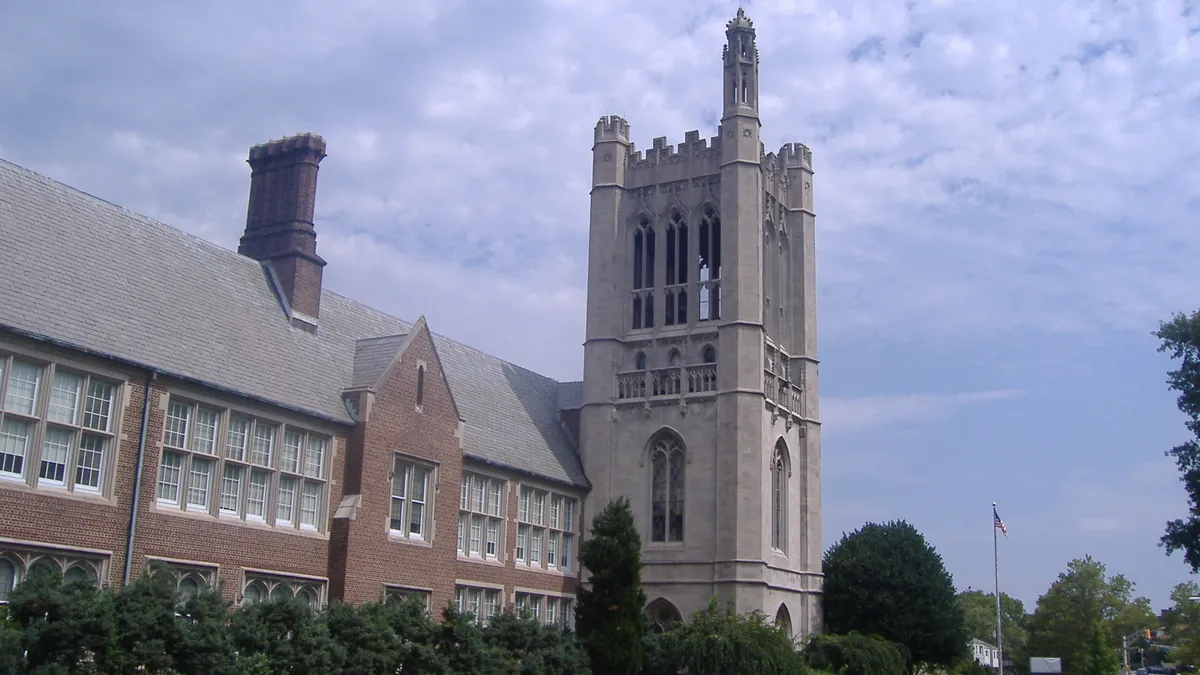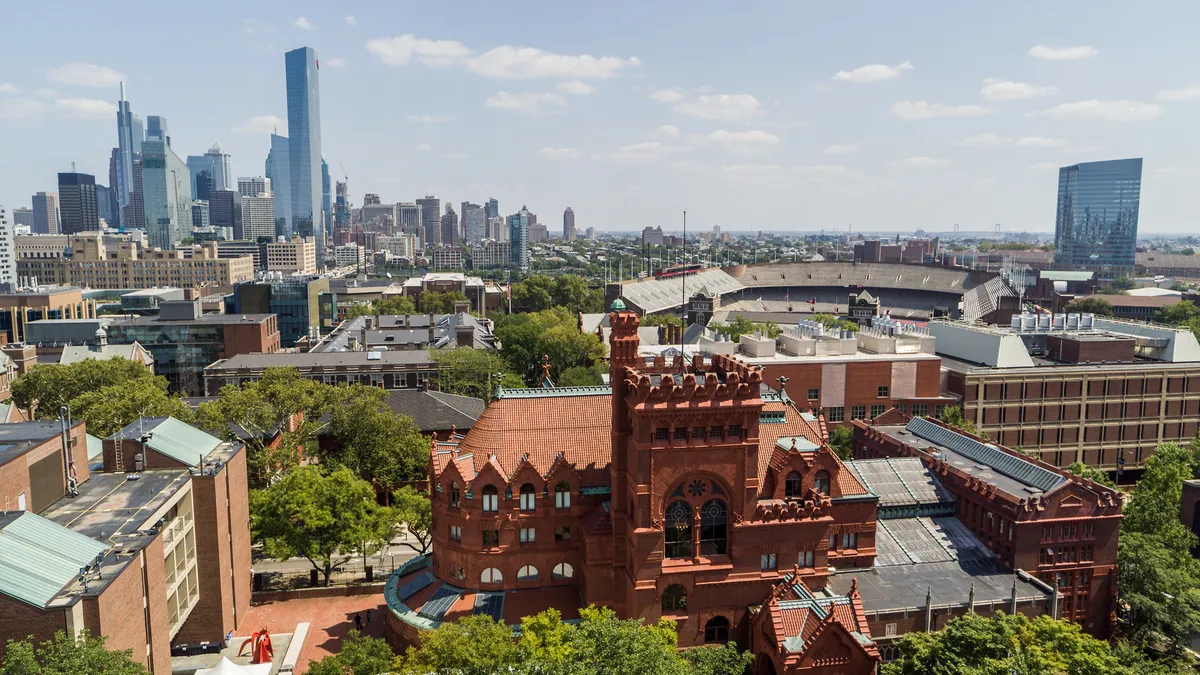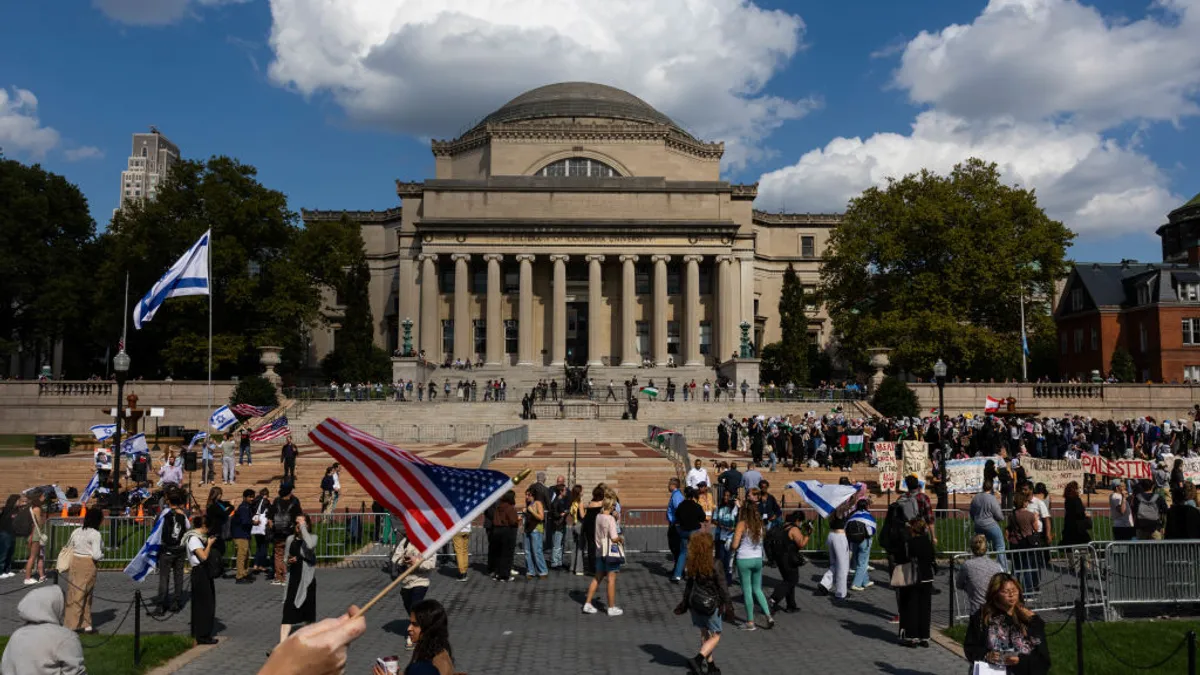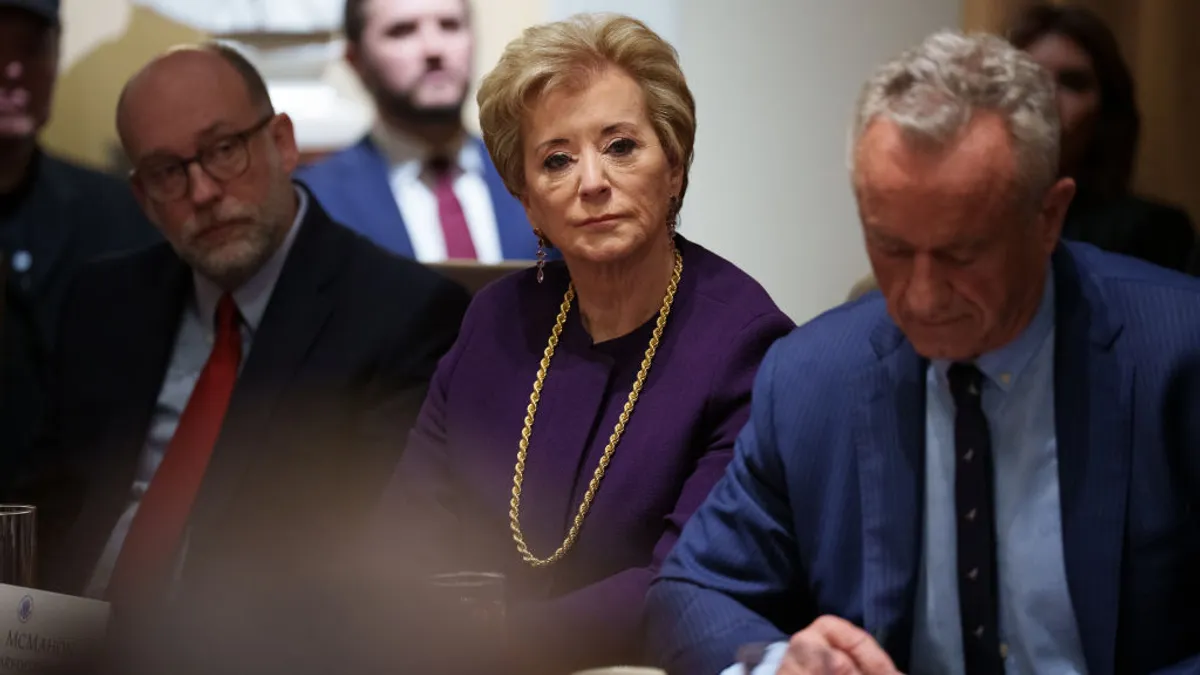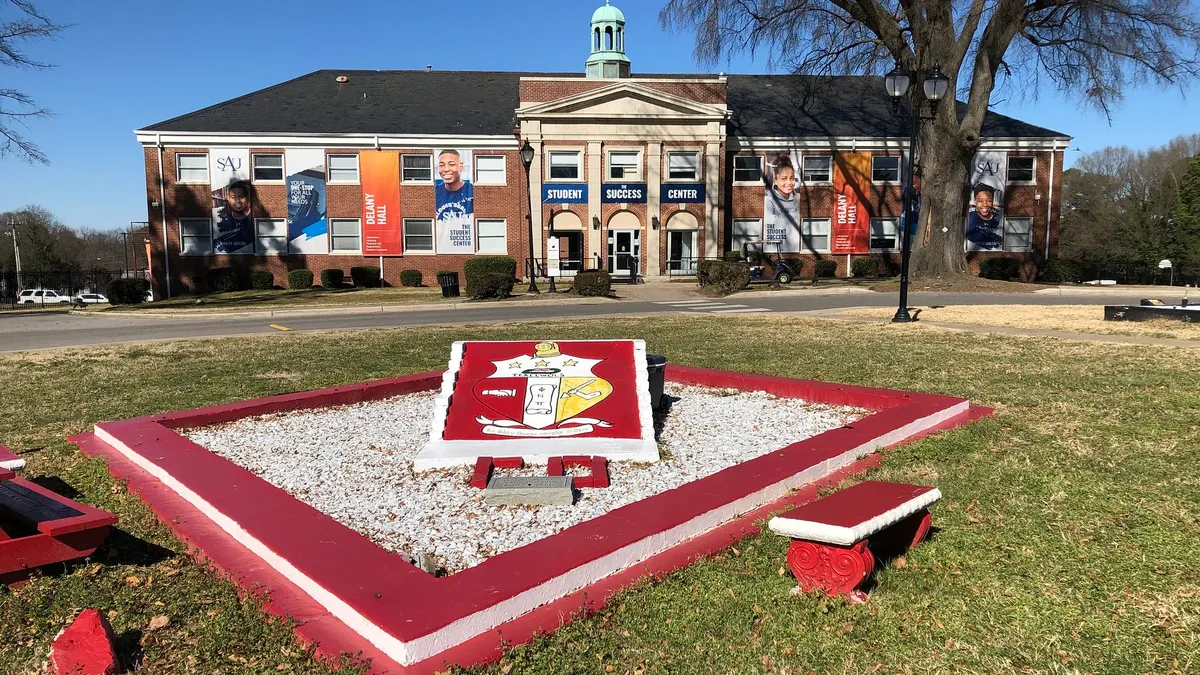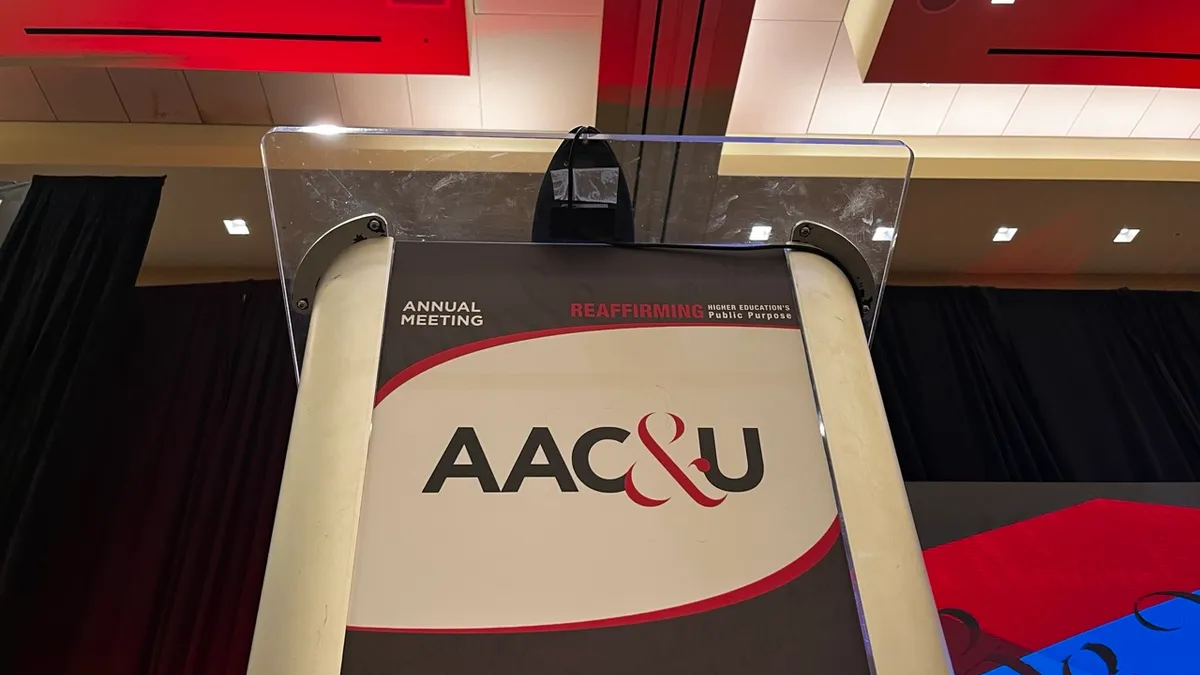Roughly one year ago, the trustee board at New Jersey City University declared a financial emergency. The same day, the university’s president, Sue Henderson, resigned after 10 years on the job.
The institution had about 26 days of cash on hand, and the financial situation was dire enough that officials suspended staff credit cards. Meanwhile, Henderson received a severance package worth roughly $350,000.
The crisis caught the public off guard and sent off shockwaves in New Jersey. Tension was acutely felt in Hudson County, home to Jersey City and one of the state’s most urban regions, just across the river from Manhattan.
NJCU had been a source of pride for the county for boosting student social mobility. The university’s 5,200 undergraduates were more than 40% Hispanic and 20% Black. More than half of them received Pell Grants.
If NJCU failed, what would happen to them?
Today, NJCU’s new leadership is just beginning to put the crisis in the rearview mirror. At the end of June, the New Jersey Legislature granted the college a $10 million lifeline. That funding covered the remaining $8.1 million deficit the university was facing in its 2024 budget, down from nearly $23 million, The Jersey Journal reported.
At the helm now is Interim President Andrés Acebo, a former senior official at the college and a Hudson County lawyer. After taking the role in January, around six months following Henderson's departure, he’s so far had a clean liftoff.
But the question remains, can he stick the landing?
What happened at NJCU?
Acebo, at 37, is the youngest person to lead a New Jersey public college. A child of Cuban immigrants and a product of county public schools, he said he left his law career and came to work at the college in 2021 because he felt a connection to its mission. And COVID-19, which hospitalized his infant son, had made him reconsider his purpose.
“The pandemic had a way of shaking priorities and life goals,” he said. “I was always proud of my roots and my community and this institution is one that has served that community for nearly a century.”
He said he wasn’t aware of the true extent of NJCU’s financial problems when he took a senior role, as chief of staff and assistant university counsel, to help the university with institutional planning and policies.
But the crisis was years in the making.
From 2011 to 2021, enrollment declined nearly 17%. Officials tried to reverse the trend with spectacular investments, according to a state comptroller investigation, like new consultants, real estate, scholarships, programs and student services.
The university spent an average of $3.5 million per year on real estate expenses from 2016 to 2021. And its spending on student services increased by 46% over a decade.
But that spending didn’t bring students back. And when the pandemic hit, things got even more dire.
The university lost nearly 1,300 students in less than two years. Senior officials, the comptroller’s office found, tried to use federal coronavirus relief funds to pay for an existing scholarship, even after they were informed it was an illegal use of the money. Most of those officials are no longer at the university.
Though the trustee board was initially unaware of the potential misuse of funds, it didn’t properly oversee the president, the investigation found. Trustees neither evaluated her performance nor probed into the causes of the financial crisis, the comptroller said.
NJCU declined to comment on former employees who were referenced in the comptroller’s findings. But Acebo said it’s clear the university didn’t pivot or “right size” itself urgently enough to address long-term enrollment trends.
“I’m focused on the institution, and I think a lot of that is perhaps what lends itself to some of the credibility that I’ve brought to this campus,” he said. “I was less focused on who’s to blame for things, but more on how to address some of these long-term and long-standing challenges that the institution has contended with.”
Living in the present
During Acebo’s tenure, the projected deficit has been cut from about $22.7 million to less than $8 million in just six months.
But that hasn’t been without pain.
In December, NJCU announced it would be cutting 48 undergraduate programs, 24 minors, 28 graduate programs, 10 certificate programs and one doctoral program. After further review, however, 31 programs were reinstated. The university’s recovery plan, released in April, said it expects savings from future staff cuts, negotiations of service agreements and divestment of some real estate assets.
Faculty are usually at the forefront of fighting such extreme cuts. But one of Acebo’s most distinctive achievements has been in rebuilding labor relations at the university.
In his previous career as a lawyer, he worked for firms on labor and employment law. Before his term as president, he was the lead negotiator on concession agreements with faculty to implement those cuts.
“It need not be an adversarial engagement or process. In order to make it productive, you have to engage in good faith,” he said. “I’ve found fewer greater partners in my short time as president than my friends in organized labor and their leaders. They’re putting the mission of this institution and its long-term sustainability first.”
Of the members of the University Senate, 95% of those who voted supported Acebo’s proposed overhaul of general education requirements. By contrast, the group had voted no confidence in Henderson in 2021.
The faculty union, an affiliate of the American Federation of Teachers, in April ratified a memorandum of understanding with the university about methods to enhance shared governance, stabilize enrollment and meet other goals.
Bill Calathes, chief negotiator for the AFT local and a criminal justice professor, told NJ Spotlight that the MOU was “the most important document that has ever come across my desk.”
“We’re showing the governor’s office, we’re showing the state of New Jersey, we’re showing every one of our stakeholders that the union is on board with four key areas that this agreement represents — our marketing and recruitment, retention, years to graduate, and job placement,” Calathes said.
Representatives of the faculty union did not respond to requests for comment.
In February, Acebo signed a labor agreement with the Hudson County Building Trades Union, committing the university to use union labor on all large construction projects.
Luke Visconti, chair of the trustee board, said Acebo’s achievement in labor relations, especially with on-campus unions, has been significant.
“Andy is extremely good at speaking with people and understanding what the message is,” he said. “We had no relationship with these people for 10 years. And Andy’s not only gotten them on board, they show up for meetings and they’re our strongest supporters. They go to Washington, they go to Trenton. This is a turnaround in six months.”
Planning for the future
There is still work to be done to bring the university back in the black.
Along with the $10 million lifeline, the New Jersey Legislature separately passed a bill creating new accountability and oversight policies for public institutions.
Acebo said the university is actively implementing recommendations from the comptroller’s office, such as developing training for board members and engaging an independent fiscal monitor. That process started before the report was released.
“Before legislation was even introduced I’ve personally advocated for fiscal monitoring of this institution,” he said. “Higher education benefits from that degree of oversight.”
Other questions still remain. The university is keeping its new campus on a retired Army fort in another county, despite criticism about the cost. The board, which seats 15 trustees, is mostly empty after the resignation of the former chair. And tuition for students will be increased by 3% for the coming academic year.
Acebo said he “certainly wasn’t coronated” as interim president — a position for which he is under a two-year contract — but understands that support, from all parties, has to be earned.
“I saw the need to be a leader on this campus in a time with considerable uncertainty,” he said. “At a time where there was not just a budgetary deficit, there was a deficit of hope, to be able to spark that hope once more is something that I felt incumbent, regardless of my role or rank, to try to help drive and speak to.”
Correction: A previous version of this article misstated the value of the former president's severance package. The article has been updated to reflect the correct value.


